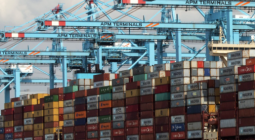Parliament backs EU carbon market overhaul, world’s first CO2 tariff

The European Parliament on Tuesday (18 April) approved sweeping reforms to make EU climate change policies more ambitious, including an upgrade of the bloc’s carbon market that is set to hike the cost of polluting in Europe.
Europe’s carbon market forces power plants and factories to buy CO2 permits when they pollute. It has slashed those sectors’ emissions by 43% since 2005 but is facing a revamp to hit more ambitious EU climate change targets.
Parliament voted to approve, with a large majority, a deal agreed last year by negotiators from EU countries and Parliament to reform the carbon market and cut EU emissions by 62% below 2005 levels by 2030.
Under the upgrade, factories will lose the free CO2 permits they currently receive by 2034, and shipping emissions will be added to the CO2 market from 2024.
World’s first carbon border levy
Lawmakers also backed the EU’s world-first plan to phase in a levy on imports of high-carbon goods from 2026, targeting imports of steel, cement, aluminium, fertilisers, electricity and hydrogen.
The carbon border adjustment border mechanism (CBAM) aims to prevent EU industries from being undercut by more-polluting foreign competitors, removing the temptation for EU firms to relocate to regions with lax environmental rules.
“To tackle the climate crisis, emissions must go down globally. When energy-intensive goods enter the EU, we’ll ensure the carbon emissions are paid for,” said Frans Timmermans, the EU’s climate chief.
As part of the same package, the Parliament also voted on plans to launch a new EU carbon market covering emissions from fuels used in cars and buildings in 2027, plus an €86.7 billion EU fund to support households affected by the costs.
The plan is expected to add 10 euro cents to the price of petrol and diesel, which sparked fears of social unrest like the 2018 yellow vests movement in France.
Those fears were dismissed by the Commission, which pointed to the new social climate fund to soften the bill on households. “Those who can pay for heat pumps and solar panels will have a stronger incentive to do so. For those who can’t do this on their own, support will be available,” Timmermans.
Final vote due in Council
The Emissions Trading System (ETS) reform was adopted with 413 votes in favour, 167 against, and 57 abstentions, while the CBAM vote was passed with 487 votes to 81 and 75 abstentions.
The large majority signals broad political support in Parliament for the reform after a political deal was struck with EU member states in December.
The laws still need final approval from EU countries, who will assess them in the next few weeks.
That approval is usually a formality that waves through pre-agreed deals – but the process was upended last month when Germany lodged last-minute opposition to another policy to phase out fossil fuel-powered cars.
Reactions
Peter Liese, Parliament’s lead negotiator on the ETS reform, said the success of the carbon market would make or break Europe’s CO2-cutting goals.
“For the climate, the ETS alone is more important than all the other files together,” he said.
The European Commission, which tabled the proposals in summer of 2021, welcomed the vote as a crucial step for climate action and the EU’s objective of cutting emissions 55% below 1990 levels by 2030.
“We are closer than ever to finalising ‘Fit for 55’ and putting the European Union firmly on track to a greener future,” said Frans Timmermans, the EU’s climate chief.
The price of EU carbon permits has soared in recent years, boosted by anticipation of the reforms – hiking costs for polluters but raising billions of euros that are returned to EU country governments to invest in climate measures.
EU carbon permits were trading at around €94 per tonne on Tuesday, nearly quadrupling in value since the start of 2020. The price hit €100 for the first time in February.
EU steelmaking association Eurofer expressed worries over the new carbon border levy, saying measures now must be introduced to ensure foreign companies do not circumvent them.
It also called for measures to support European steel exports in the face of competition from foreign producers, which do not face the same carbon constraint. “Otherwise, we risk losing €45 billion of EU steel exports and consequently related production capacity and jobs,” Eurofer said.
cover photo: The large majority signals broad political support in Parliament for the reform after a political deal was struck with EU member states in December.






